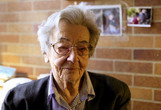Micaela Serra
My Role Model: |
 |
Physicist, Metallurgist and pioneer of archaeometry; humanitarian, pacifist and feminist
Read about her from the Canadian Government website (Order of Canada). or the interesting entry from Wikipedia (http://en.wikipedia.org/wiki/Ursula_Franklin).
Renowned for her achievements in the field of metallurgy, Dr. Ursula Franklin has also worked tirelessly to bring a humanitarian and feminist voice to the world of science.
In 1967, Dr. Franklin joined the University of Toronto's Department of Metallurgy and Materials Science, and in 1984 became the first woman there to be granted the title of University Professor, the highest honour given by the university. While continuing her work in the dating of copper, bronze, metal and ceramic artifacts of prehistoric cultures in Canada and elsewhere, she was and continues to be actively involved in numerous humanitarian and feminist activities such as encouraging young women in science, working for peace and justice, and disseminating her thoughts on the social impacts of science and technology.
Franklin believes that science has been severely impoverished because women are discouraged from taking part in the exploration of knowledge. She feels that women scientists use the tools of science to answer questions that may not otherwise be asked by their male counterparts. She observes that women bring to science a spirit of cooperation as well as a concern for the connection between knowledge gained and its potential impact on communities, rather than its economic impacts. When looking at the history of women in science, Franklin asserts that women have established new fields of, and made some of the most profound contributions to, interdisciplinary research. She sees much of this innovation as a result of women scientists working on the margin of mainstream science and so seeing its failings more objectively.
Franklin's own experience with metals and alloys has taught her that just as the properties of an alloy are determined in part by its structure, so the study of structure is essential to understanding human affairs. Franklin views attempts to buy political and social solutions to problems without addressing the structures that cause them as bound to fail. Rather she recommends looking at problems holistically by examining both their causes and effects.
In 1989, Ursula Franklin delivered the Massey Lectures, originally broadcast as part of CBC Radio's Ideas series and subsequently published in book form. The lectures were called "The Real World of Technology" and were an attempt to understand how science and technology shape our society and are, in turn, shaped by the demands that society makes of them. Franklin argues that the technology developed since the Industrial Revolution has fostered a "culture of compliance." To combat the gradual transfer of power and control into fewer and fewer hands, she recommends that people trust their own senses and not allow others to censor their imaginations. She encourages people to become "citizen scientists," that is, to gain a general knowledge of scientific and technical information in order to understand issues and, if necessary, protest until there is a change in the structures of technology.
